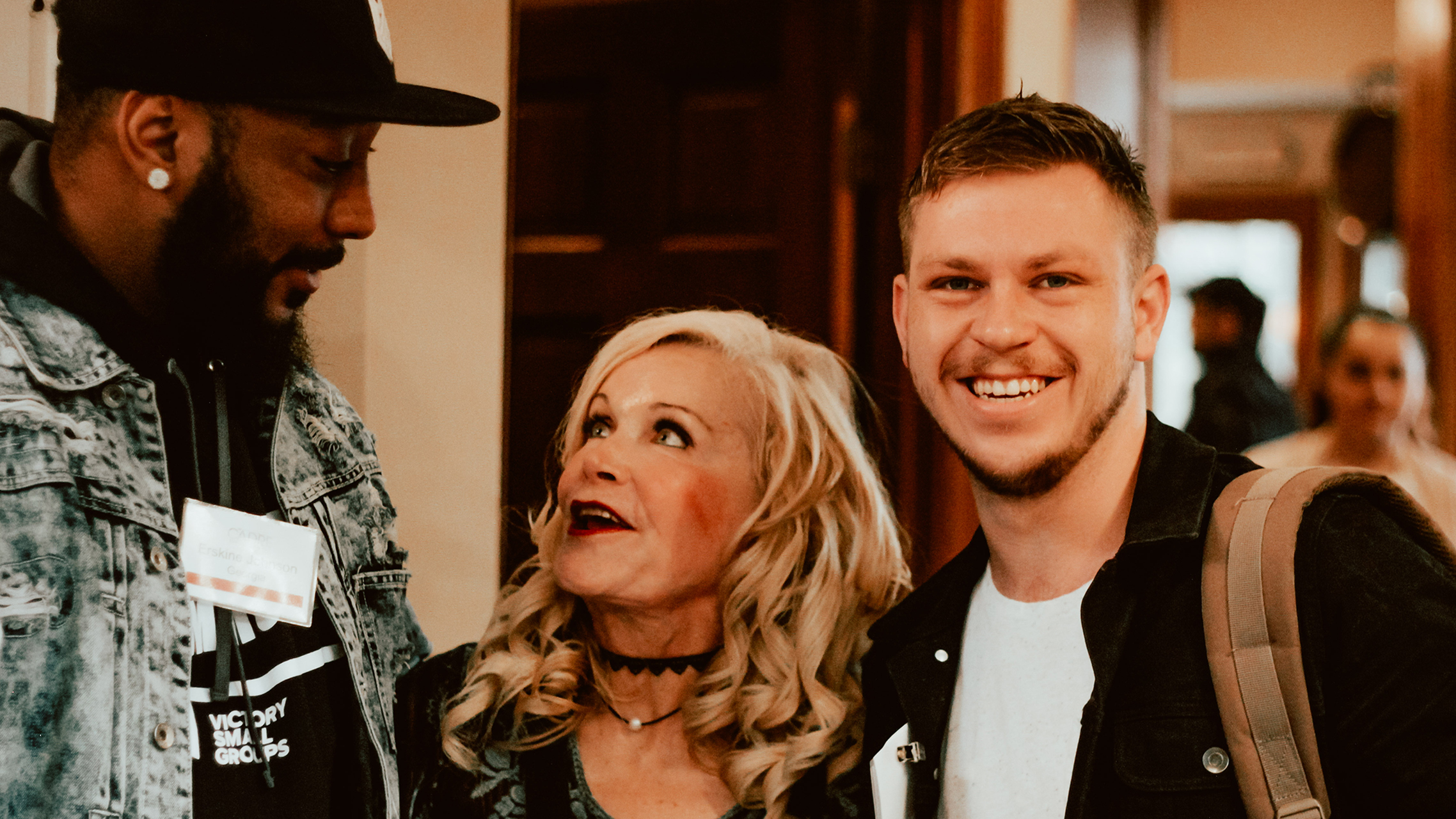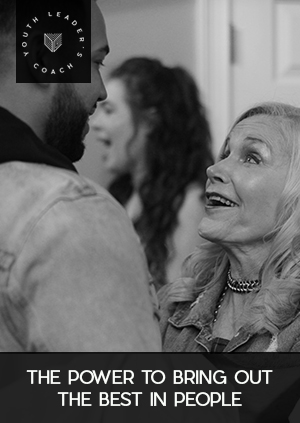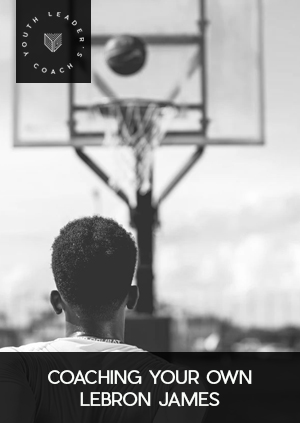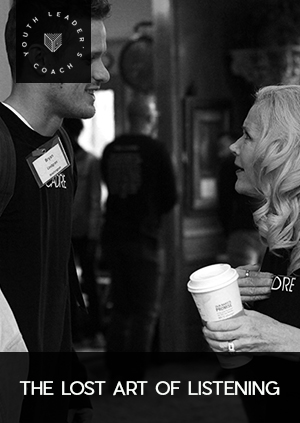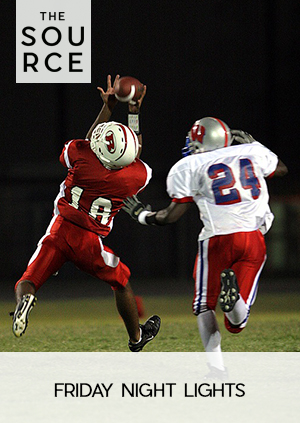Connect...Before You Correct
I think Jesus Himself was a "CONNECTOR" before He was a "CORRECTOR." Remember how He dealt with the woman at the well, the tax collector found in a tree, and the lady exposed in adultery? He took time to personally connect with their feelings before he began to share His specific advice. So let me give you a few simple counseling highlights that go along with this principle:
- Remember that listening is usually more healing than talking. We often forget this vital counseling insight. When a teenager starts to share, we break into the conversation and quickly begin to dispense our "vital wisdom." I think that's a mistake. In short, listen more and talk less. I think that simple awareness alone will make you profoundly more powerful in counseling situations.
- Teach yourself to make "say-it-back-statements" so the student senses that you really are deeply connecting with what they are feeling. By this I mean saying things like, "That must have really hurt" or "I can't imagine how painful that probably felt."
- Don't cheapen every problem by saying, "I know just how you feel." It's great to relate your own personal struggles to their situation, but often, we spend 3 minutes listening to their situation and the next 10 minutes then relating our own situation. In reality, it almost feels like we're having a "problem competition." I'm constantly amazed how many students say things like, "Thanks, Jeanne...you've really helped a lot," before I get a chance to say anything substantial at all. Why? I think the sheer act of deep listening is often more helpful than our lengthy babbling.
- At all costs, avoid "T.R.T." That stands for "typical religious talk." I'm not saying to leave Scripture or prayer out of the conversation. I'm just suggesting that you listen to yourself talk and make sure you are doing more than spewing back some often-repeated religious jargon.
- Know when to call in the pros and do a counseling referral. I've lost track of the number of times that I've been "over my head" in a counseling situation. I've often said, "I want to be your friend and help you through this situation; but can I connect you with someone who can be even more help to you than me?" Yet, student after student has told me later that the pro's advice was not nearly as meaningful as my personal love and concern. So even when you do a referral, don't underestimate the power of your continued listening and friendship.
In short, I have great news for you today. If you've had little or no professional training in counseling, you can still be immensely significant in a teenager's life. When they start to share their heart with you, just mentally repeat to yourself, "Lord, help me not to fix it before I feel it." The results will make you one of the teenager's most valued counselors. I promise.
I think Jesus Himself was a "CONNECTOR" before He was a "CORRECTOR." Remember how He dealt with the woman at the well, the tax collector found in a tree, and the lady exposed in adultery? He took time to personally connect with their feelings before he began to share His specific advice. So let me give you a few simple counseling highlights that go along with this principle:
- Remember that listening is usually more healing than talking. We often forget this vital counseling insight. When a teenager starts to share, we break into the conversation and quickly begin to dispense our "vital wisdom." I think that's a mistake. In short, listen more and talk less. I think that simple awareness alone will make you profoundly more powerful in counseling situations.
- Teach yourself to make "say-it-back-statements" so the student senses that you really are deeply connecting with what they are feeling. By this I mean saying things like, "That must have really hurt" or "I can't imagine how painful that probably felt."
- Don't cheapen every problem by saying, "I know just how you feel." It's great to relate your own personal struggles to their situation, but often, we spend 3 minutes listening to their situation and the next 10 minutes then relating our own situation. In reality, it almost feels like we're having a "problem competition." I'm constantly amazed how many students say things like, "Thanks, Jeanne...you've really helped a lot," before I get a chance to say anything substantial at all. Why? I think the sheer act of deep listening is often more helpful than our lengthy babbling.
- At all costs, avoid "T.R.T." That stands for "typical religious talk." I'm not saying to leave Scripture or prayer out of the conversation. I'm just suggesting that you listen to yourself talk and make sure you are doing more than spewing back some often-repeated religious jargon.
- Know when to call in the pros and do a counseling referral. I've lost track of the number of times that I've been "over my head" in a counseling situation. I've often said, "I want to be your friend and help you through this situation; but can I connect you with someone who can be even more help to you than me?" Yet, student after student has told me later that the pro's advice was not nearly as meaningful as my personal love and concern. So even when you do a referral, don't underestimate the power of your continued listening and friendship.
In short, I have great news for you today. If you've had little or no professional training in counseling, you can still be immensely significant in a teenager's life. When they start to share their heart with you, just mentally repeat to yourself, "Lord, help me not to fix it before I feel it." The results will make you one of the teenager's most valued counselors. I promise.
Related Items
In this Youth Leader's Coach I hit on a topic that, quite frankly, I do not see a lot of us being very good at, yet this is such an essential key in youth ministry! We're talking about "The Power To Bring The Best Out In People."
The implications of being able to encourage people to be all they can, are seen in every relationship - from your teenagers and leaders to your friendships and family. Authentic, genuine encouragement and affirmation has the great power to draw the best out in people! Let me dialogue with you about this vital ability we all need to keep developing in our lives. This is going to be a good one!
Affirming the best in you,

If you followed me around through my more than 40 years in full-time youth ministry, you would see me follow one workable discipleship pattern with youth and young adults over and over again. Granted, the pattern has emerged from costly trial and error.
In this month's Youth Leader's Coach, "Greatest Discipleship Secrets," allow me to share with you my pragmatic gleanings from decades of relational discipleship. I promise you, if given time, these pragmatics could be some of the greatest gifts you to your youth ministry!
Happy Listening,

If you fail with a student in middle school, you will have a much more challenging job ever reconnecting with them in later years. These are the most impressionable years of life...even more impressionable than the years between birth and age 2. It’s the opportunity to reach them before they need rescued. To help them hit the pause button as they go from listening to and believing everything their parents said to owning their own thoughts and their own faith.
I'm excited about this Youth Leader's Coach, "Middle School Ministry: Stuck In The Middle" because I get to share this message with my dear and trusted friend, Judy Gregory, who was part of the Youth Leader’s Coach team for years and before that spent 10 years raising up a middle school youth ministry of over 500 students. So, listen in as we share ideas on effectively impacting students in these highly important years.Lovingly,

LeBron James is one of the most respected men in the history of basketball. He once stated his life goal as this, "I want to be the greatest basketball player of all time. And that's my motivation. It's not simple, but for me it is. That's my mind frame." And believe it or not, my friends, we all have our own LeBron James to coach to be the best.
Who are the " LeBron James'" in our ministry world? They are people who have an immense level of leadership, influence or giftedness that we are tasked with leading for a season. Our goal in leading them should be to make them the VERY BEST THEY CAN BE within the time we are trusted to lead them.
So in this month's Youth Leader's Coach, "Coaching Your Own LeBron James," I'm sharing some pragmatics on how to effectively lead those who are highly gifted, influential leaders. This is a "do not miss" resource. So grab a coffee and listen in.
Lovingly,

It seems that today's church world seems to be much more focused on TALKING than on LISTENING. People often ask me how to GROW their ministry or how to PREACH with more skill. But rarely, if ever, do people ask me how to LISTEN more effectively. I think INTENTIONAL LISTENING is one of the greatest gifts you can ever give to another human being.
Let me ask you a really important question in youth ministry: How good of a listener are you...really? In this Youth Leader's Coach, I share nine ways that you can raise your "L.Q." (Listening Quotient). Remember, it was Voltaire that said, "The ears are the highway to the heart." And after lots of years in youth ministry trenches, I promise you that intentional listening is a really, really big deal.
Lovingly,

